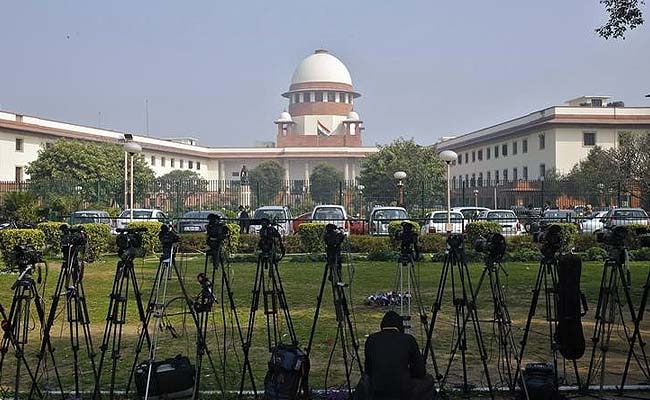
The Supreme Court will hear the Central government's plea to hear all demonetisation cases in 1 court
New Delhi:
The Supreme Court today agreed to hear on November 23 a plea of the Centre seeking transfer of all demonetisation cases to either one high court or the Supreme Court.
A bench of Chief Justice TS Thakur and Justice DY Chandrachud listed the matter after Attorney General Mukul Rohatgi mentioned it and sought an urgent hearing.
Rohatgi said that as directed by the Supreme Court on the last hearing of the case, the Centre has filed the transfer petition.
The Supreme Court had on November 18 dubbed as a "serious issue" the long queues outside banks and post offices and expressed its reservation on the Centre's plea seeking a direction that no other court in the country should entertain petitions challenging the November 8 notification demonetising Rs 1,000 and Rs 500 currency notes.
It had made the remarks after the AG submitted that any matter relating to challenge to the demonetisation issue be heard by the Supreme Court only.
However, the bench had said, "People are affected. People are frantic. People have the right to approach the courts," noting that people were facing difficulties.
The bench had questioned the relief measures undertaken by the Centre and asked why it had squeezed the exchange limit to Rs 2,000.
The AG had then explained the situation by stating that after printing, the currency has to be moved to thousands of centres across the country and ATMs have to be re-calibrated.
He had also said that Rs 100 notes are in circulation and the ATMs needed to be re-calibrated to issue new currency notes of Rs 500 and Rs 2,000.
The Centre had moved the Supreme Court on November 17 seeking a stay on the proceedings before various high courts and other courts except the Supreme Court against demonetisation issue, saying otherwise it will create a lot of confusion.
The Supreme Court had on November 15 refused to stay the government's demonetisation notification, but asked it to spell out the steps taken to minimise public inconvenience.
Prime Minister Narendra Modi, in a televised address to the nation on November 8, had announced that Rs 500 and Rs 1000 notes will no longer be legal tender from November 9.
He had said the government has declared a "decisive war" against black money and corruption.
A bench of Chief Justice TS Thakur and Justice DY Chandrachud listed the matter after Attorney General Mukul Rohatgi mentioned it and sought an urgent hearing.
Rohatgi said that as directed by the Supreme Court on the last hearing of the case, the Centre has filed the transfer petition.
The Supreme Court had on November 18 dubbed as a "serious issue" the long queues outside banks and post offices and expressed its reservation on the Centre's plea seeking a direction that no other court in the country should entertain petitions challenging the November 8 notification demonetising Rs 1,000 and Rs 500 currency notes.
It had made the remarks after the AG submitted that any matter relating to challenge to the demonetisation issue be heard by the Supreme Court only.
However, the bench had said, "People are affected. People are frantic. People have the right to approach the courts," noting that people were facing difficulties.
The bench had questioned the relief measures undertaken by the Centre and asked why it had squeezed the exchange limit to Rs 2,000.
The AG had then explained the situation by stating that after printing, the currency has to be moved to thousands of centres across the country and ATMs have to be re-calibrated.
He had also said that Rs 100 notes are in circulation and the ATMs needed to be re-calibrated to issue new currency notes of Rs 500 and Rs 2,000.
The Centre had moved the Supreme Court on November 17 seeking a stay on the proceedings before various high courts and other courts except the Supreme Court against demonetisation issue, saying otherwise it will create a lot of confusion.
The Supreme Court had on November 15 refused to stay the government's demonetisation notification, but asked it to spell out the steps taken to minimise public inconvenience.
Prime Minister Narendra Modi, in a televised address to the nation on November 8, had announced that Rs 500 and Rs 1000 notes will no longer be legal tender from November 9.
He had said the government has declared a "decisive war" against black money and corruption.
Track Latest News Live on NDTV.com and get news updates from India and around the world

